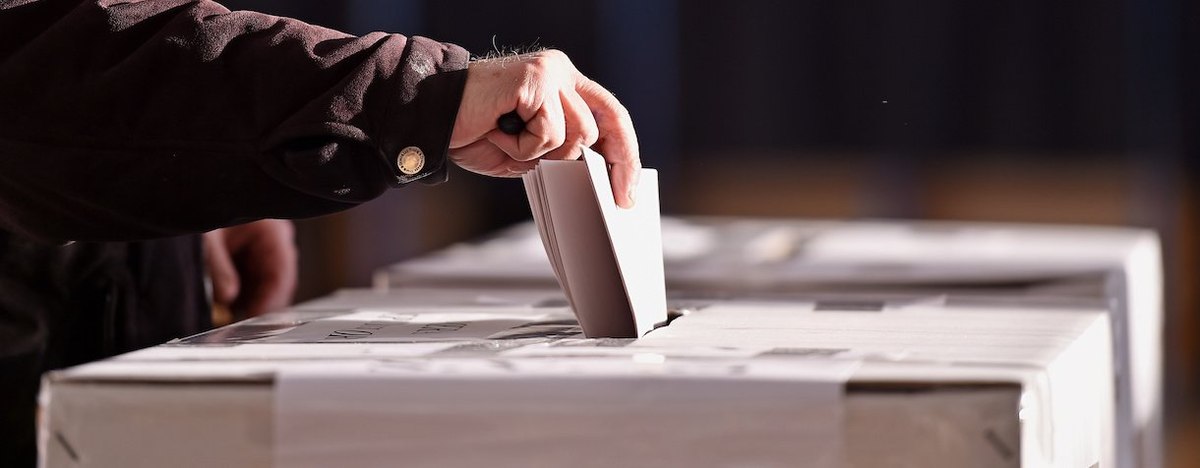New YouGov surveys asked Americans about global elections happening in 2024 and what they perceive the voting experience to be in some other countries. With the exception of the U.S., majorities of Americans are unsure about which countries have had or will have national elections in 2024. The survey also found that most Americans believe it’s easy for eligible voters to cast a ballot in the U.S. and nearly all believe that some level of fraud happens in U.S. elections.
The vast majority of Americans (86%) know that there’s a national election happening in the U.S. in 2024. Far fewer are certain there have been or will be 2024 elections in Russia (27%), Mexico (13%), India (13%), or Taiwan (10%). Almost no Americans know of 2024 elections in Pakistan (5%), Iran (4%), or Indonesia (4%).
Among Americans, 13% believe a national election is happening in the United Kingdom in 2024, 17% say it is not and 71% don’t know. On May 22, 2024 — about three weeks after this YouGov poll was conducted — Prime Minister Rishi Sunak announced a snap general election to take place in the UK on July 4.
In Ukraine, an election had been scheduled for March or April of this year. However, because the country is under martial law, the election has been indefinitely postponed. Among Americans, 7% say there is an election happening in Ukraine in 2024, 23% say there is not, and the remaining 71% are unsure.
Americans who have a college degree are particularly likely to know that Russia (37%) and India (21%) had or are having 2024 elections. They also are more likely than Americans overall to know that the U.S. is going to have an election in 2024.
46% of Americans believe it’s very easy for eligible voters in the U.S. to vote in elections and 34% believe it is somewhat easy. Republicans are especially likely (71%) to say it’s very easy; 39% of Independents and 29% of Democrats say the same.
One in five (20%) Americans believe that it’s easier for an eligible voter to vote in elections in the UK than in the U.S.. 44% believe it’s as easy to vote in the UK as it is in the U.S. and 7% believe it’s harder to vote in the UK as an eligible voter.
The majority of Americans (56%) believe that it’s harder to vote as an eligible voter in Iran than it is in the U.S. Similarly, 53% of Americans believe it’s harder for an eligible voter to cast their ballot in Russia compared to the U.S.
One-quarter of Americans believe there is a lot of fraud in U.S. elections. 30% say there is some fraud, 29% say there is not much fraud, and 10% say there is no fraud in U.S. elections.
Republicans are particularly likely (43%) to say that there is a lot of fraud in U.S. elections. 23% of Independents and 10% of Democrats agree.
Among Democrats, 21% believe there is no fraud in elections in the U.S.; 6% of Independents and only 2% of Republicans say the same.
Elections in Russia are subject to more fraud than elections in the U.S., according to 56% of Americans. 10% of Americans think elections in the two countries have similar levels of fraud, and 7% think there’s less fraud in Russian elections than in American ones.
Only 5% of Americans think elections in the UK are subject to more fraud than elections in the U.S. 42% think elections in the UK have the same amount of fraud as elections in the U.S. and 21% of Americans say that there is less fraud in elections in the UK.
— Taylor Orth and Carl Bialik contributed to this article
Related:
- What Americans think about the 2024 presidential race
- Most Americans believe Russia is trying to influence the election
- How Americans want the government to handle the issues that matter most to them
See the results for these YouGov polls on knowledge of global elections and voting in global elections
Methodology: The YouGov polls were conducted online on May 2 - 6, 2024 and May 3 - 6, 2024, among 1,156 and 1,162 U.S. adult citizens, respectively. Respondents were selected from YouGov’s opt-in panel using sample matching. A random sample (stratified by gender, age, race, education, geographic region, and voter registration) was selected from the 2019 American Community Survey. The sample was weighted according to gender, age, race, education, 2020 election turnout and presidential vote, baseline party identification, and current voter registration status. Demographic weighting targets come from the 2019 American Community Survey. Baseline party identification is the respondent’s most recent answer given prior to November 1, 2022, and is weighted to the estimated distribution at that time (33% Democratic, 31% Republican). The margin of error for the overall sample in each survey is approximately 4%.
Image: Adobe Stock










